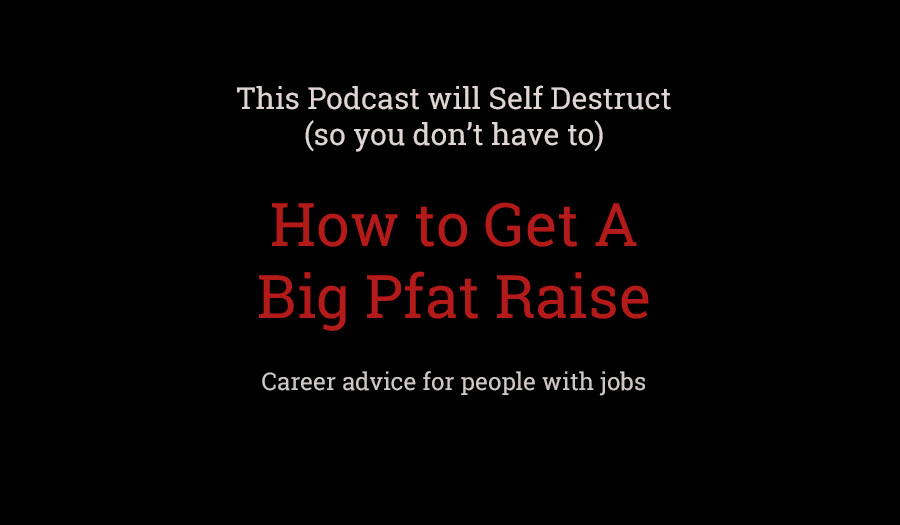When it comes to boosting your bottom line, little raises will make little difference. Instead, aim high.
This is an experimental podcast on career advice for carpenters. In it, we reveal the story behind why your boss can't give you a raise when you ask, why it wouldn't matter if they could, and how to work through the minefield.
Official transcript:
Phone ring:
“Hello, this is Rick”"Hey Boss, I spent waaaaay too much this year; summer vacation with the kids and eating out with my wife has put my budget upside down.
How's about a big phat raise to make me happy?"
"Sure thing, Bob. How much can I give you?"
OK, that is a conversation that you will never hear.
Getting a raise does not work like the previous conversation because there are way more moving parts in the picture than that scenario represents. There are at least four things to consider, that you may not have thought about.
- One part is that unless your boss is the owner of the company, she doesn't have the authority to give you a raise. Even if she is the owner of the company, she probably has to confer with the accountant and her partner. The best your boss can do is lobby on your behalf.
- Another moving part is taking a look at what the budget actually looks like. What's going out and what's coming in? And where does labor fall in the list of expenses—is it the smallest number or biggest?
- Cost of living and inflation is another part—how much more does stuff cost, where you live and work, today than it did a year ago?
- How much of a raise do you want, and why does it matter to you? Which might seem like a strange question, but it will help you land softly when you smack up against the hard realization that a meaningful raise is unlikely to happen any time soon.
Unless you lay the groundwork—which I will talk about in a minute.
So those are some of the moving parts. I'm going to talk about each one a little bit and then I'll talk a little about how to actually get a big pfat raise—how to frame that conversation and what steps to take before you have that conversation.
First, let's look at why it is harder than many people realize.
It may seem surprising, but your boss is usually powerless to just up and give you a raise. It is not as easy as opening his wallet.
He will usually need his partner's approval and approval from the finance person at the very least. If your boss doesn't have a businesses partner and you think for one second that your boss’s partner is not their spouse, then you're wrong.
If you are in a larger company there may be an HR department, and a person or two abo ve your boss—who need to approve the raise. As well as HR and Finance.
That is not to say that it cannot happen, but it is to say that it cannot happen as quickly as you hope it will.
And it is important to understand the process—so you don't look like a dope.
If you understand the process, you look like leadership material rather than someone who has no sense of organizational hierarchy. And as I'll talk about later, that's how you get big raises.
OK, Let’s talk about the budget
Labor is usually the largest expense in a company's operating budget
Think about that for a minute. The biggest hole in the bank account is people. Labor is also the most volatile item, it is much less predictable than plywood.
Put another way, the easiest way to cut outgo and reduce uncertainty, is to cut labor.
Did you hear what I just said? — The easiest way to cut outgo is to cut labor.
There are at least a few implications to THAT, as well, but I'm going to use it as a chance to bust a cliche.
“The squeaky wheel gets the grease.”
Sometimes the squeaky wheel gets the grease, but it often gets replaced if it doesn't stop squeaking. What I mean, is that if you complain about your paycheck, you might be seen as more trouble than you are worth.
Everyone is expendable. The rest of the guys can absorb your productivity. They have done it before. And while they're doing it, your old boss is bleeding fewer dollars each week.
Cost of living and inflation
Cost of living is how much more or less stuff costs in your town compared to the national average. Like a carpenter. A carpenter in Memphis cannot expect the wages of a carpenter in Manhattan.
Inflation is much more stuff costs today than it did a year ago. Inflation is usually about 2 or 3 percent—the same as annual bumps at work.
So, if you want a raise, and inflation is about 3%, you need more than 3% for it to even be a raise, right? If you get a 3% raise, which is a typical raise, you're flat.
This takes us to part 4 of the podcast:
How much of a raise do you need? And why?
Because an annual raise is rarely much of a raise. If you're making $25/hour, that's $1,000/ week before taxes and probably $750/week after taxes. A 5% raise is 38 bucks each week.
You're probably not going to get a 5% raise in this economy. But let's pretend you do, just as a thought exercise. Thirty eight bucks a week is five bucks a day. Is five dollars a day really going to make that big a difference in your budget?
Maybe.
But chances are, you can cut some outgo that would have a bigger effect. You could quit smoking cigarettes and save more than that.
So if your budget is driving the need for a raise, that is something that is disconnected from your job, and you should look closer at your budget. Don’t ask your boss to solve your budget problems.
We just thought exercised our way to seeing that even a five percent raise is not that much. Heck, your boss may not even give annual cost-of-living bumps, but if she does, thank her and don’t complain.
Because it costs her a lot more than the 3% you’re getting. Because of the other implication of that 3% cost of living increase: it costs the company 3% more each year just to remain flat. So they have to grow each year just to break even.
That stuff is important to understand as an employee, and even more important to understand when you start your own company.
On to the meat of the package:
How to actually get a raise.
I just debunked a cliché a minute ago about squeaky wheels, here's another one:
The adage "You don't get what you deserve, you get what you negotiate" is bull feathers.
You don't get what you deserve, you get what you are worth. And what you are worth is directly related to thee things:
- How much money you make for the company,
- How much money you save the company,
- How much money you cost the company.
If a company's revenue is flat year over year, and the boss gives you a 3% bump, the company just shrunk 3%. But really it shrunk 6% because inflation is hitting the company, too.
Also, the company pays more than 3% for your 3% raise. It pays probably 4% with taxes, workers comp, and benefits included.
So when the company gives you a 3% raise, it shrinks 10%.
Most companies strive for growth.
If a company wants to grow 10% next year, and they give you a 3% cost of living increase, then the company needs to grow 20% — just to grow 10%.
Now obviously, this is fuzzy math because there are usually more people in the company that you, and 3% of your salary does not equate to 3% of revenue, but it illustrates a realistic scenario.
Let's look at those same numbers through a different lens: If the company's revenue falls 5% this year over last year, do you expect a 5% pay cut?
No, you do not. You expect a raise. Less income, more even outgo. And you represent some of that outgo.
Like in the cartoons, when Elmer Fudd looks at Bugs Bunny and sees cooked rabbit on a plate, when the boss looks at you, she sees a hole in her bank account.
You want to look like a revenue stream rather than a drain on her budget.
In other words, It is better to be a lump than a hole.
OK, so most companies strive for growth, and this is how you can position yourself to get the big raise. There are three ways for the company to grow:
- More income
- Less outgo
- Both
In other words, more money coming in, better productivity—including less material waste, or all of the above.
You probably do not have much control over bringing in revenue, unless you are in sales. Unless you are the job boss, you can't really boost the productivity of the team, so how can you affect the bottom line of the company tomorrow morning?
Improve your own personal efficiency
If you can cut a one-hour task by 12 minutes, you have just achieved a 20% boost in efficiency.
Is the company suddenly 20% more profitable? No. But your corner of the company is on track for 20% growth.
Now, you are a stream, not a drain.
How can you do it?
- Stop walking around the house the long way from the saw station to the tool van. In fact, stop walking to the tool van by 50%. Start carrying the correct extra tool in your nail bags that you will need today so you don't have to do up-the-ladder-down-the-ladder all afternoon. The ladder game turns a ten minute job into a thirty minute job. Consider trips to the tool trailer or lumber yard a sign of weakness. An admission of inferiority.
- Stop taking twice as long to roll out in the morning and roll up in the evening. Think about what you need while you drive to work in the morning. Not after you get out of the car.
- Stop mucking things up causing them to need to be done over. Mistakes happen every day, but if you can head a few off at the pass, your team, or your corner of it, will be more productive and more profitable.
- Stop wasting your boss's time. Time is money. If your boss is messing around with goofy crap on jobsites, the boss is not selling more (or better) jobs. If the boss is solving your problems, the boss is not solving customers problems. Solving customers problems=revenue. Solving your problems=[drain sound]
- Start thinking two or three steps in advance so that things will be easier two steps down the road. Don’t pile lumber where you’ll need to set up a scaffold in three days.
- If you can work with the next subcontractor in mind, you can not only boost your own efficiency, but you can boost the drywall guys'. Imagine what it will do for your stock price if all of the subs tell your boss how smooth the your projects go. Compared to other people’s projects.
It means the bottom line is closer to the top line by cutting out some of the junk in the middle.
If you do this, figure out a way to quantify it and make a note of it. Having this data will help you in the conversation you have with your boss about a raise. Data is better than emotion in those conversations.
Talk to your boss about growth
The other major part of the picture is communicating with your boss about her goals and how to align your goals with them. Everyone needs to be paddling in the same direction, and that is frequently not the case.
If the boss wants to grow the company, it is good to know that. If the boss wants to add a crew, it is good to know how you can build your talent and skills to lead that crew.
There is always opportunity for advancement, even if it does not look that way. And it is NOT a zero sum game. Just because there is a supervisor does not mean there is not room for another supervisor. Maybe the company does not want to add a crew, but maybe you can raise the level of services the existing crew provides.
Now—in September—is an excellent time to have lunch with the boss and ask about plans for next year, room for advancement, and areas of growth for the company that you could help with. Areas of personal growth that you need to focus on.
And that's where I am going to back into the answer to the question about how to get a big pfat raise: It is simple: get promoted.
The best opportunities for meaningful raises are from promotions, not annual bumps. Ask how you can help the company grow—by leading a new crew, offering a new service, reducing common callbacks, or simply boosting productivity and reducing waste.
It is the company's job to be in business and to be profitable so that it can fulfill its obligation to you—a paycheck each week, every week, so you can feed your family and keep a roof over their head. And send your kids to college.
- Your job is to help the company grow.
- Your job is to execute the plans efficiently.
- Your job is to bring your boss solutions, not problems.
- Your job is to make your boss's job easier.
Because if the boss doesn't have to worry about you, she can sell bigger and more profitable jobs.
If you do more and help improve the bottom line, then a bigger salary bump or promotion is justified.
If you want to make more, do more. Learn more. Know more.
—Dan Morrison is technical editor of ProTradeCraft. The good judgment expressed in this podcast comes from his vast career experience—which came from bad judgment.













